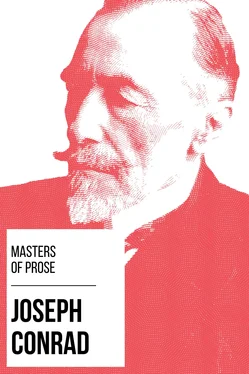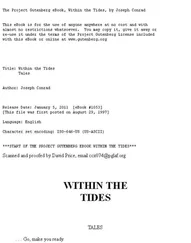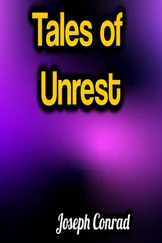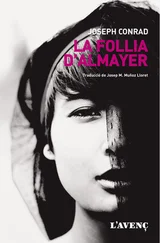As in political so in literary action a man wins friends for himself mostly by the passion of his prejudices and by the consistent narrowness of his outlook. But I have never been able to love what was not lovable or hate what was not hateful out of deference for some general principle. Whether there be any courage in making this admission I know not. After the middle turn of life's way we consider dangers and joys with a tranquil mind. So I proceed in peace to declare that I have always suspected in the effort to bring into play the extremities of emotions the debasing touch of insincerity. In order to move others deeply we must deliberately allow ourselves to be carried away beyond the bounds of our normal sensibility—innocently enough, perhaps, and of necessity, like an actor who raises his voice on the stage above the pitch of natural conversation—but still we have to do that. And surely this is no great sin. But the danger lies in the writer becoming the victim of his own exaggeration, losing the exact notion of sincerity, and in the end coming to despise truth itself as something too cold, too blunt for his purpose—as, in fact, not good enough for his insistent emotion. From laughter and tears the descent is easy to snivelling and giggles.
These may seem selfish considerations; but you can't, in sound morals, condemn a man for taking care of his own integrity. It is his clear duty. And least of all can you condemn an artist pursuing, however humbly and imperfectly, a creative aim. In that interior world where his thought and his emotions go seeking for the experience of imagined adventures, there are no policemen, no law, no pressure of circumstance or dread of opinion to keep him within bounds. Who then is going to say Nay to his temptations if not his conscience?
And besides—this, remember, is the place and the moment of perfectly open talk—I think that all ambitions are lawful except those which climb upward on the miseries or credulities of mankind. All intellectual and artistic ambitions are permissible, up to and even beyond the limit of prudent sanity. They can hurt no one. If they are mad, then so much the worse for the artist. Indeed, as virtue is said to be, such ambitions are their own reward. Is it such a very mad presumption to believe in the sovereign power of one's art, to try for other means, for other ways of affirming this belief in the deeper appeal of one's work? To try to go deeper is not to be insensible. A historian of hearts is not a historian of emotions, yet he penetrates further, restrained as he may be, since his aim is to reach the very fount of laughter and tears. The sight of human affairs deserves admiration and pity. They are worthy of respect, too. And he is not insensible who pays them the undemonstrative tribute of a sigh which is not a sob, and of a smile which is not a grin. Resignation, not mystic, not detached, but resignation open-eyed, conscious, and informed by love, is the only one of our feelings for which it is impossible to become a sham.
Not that I think resignation the last word of wisdom. I am too much the creature of my time for that. But I think that the proper wisdom is to will what the gods will without, perhaps, being certain what their will is—or even if they have a will of their own. And in this matter of life and art it is not the Why that matters so much to our happiness as the How. As the Frenchman said, “Il y a toujours la maniere.” Very true. Yes. There is the manner. The manner in laughter, in tears, in irony, in indignations and enthusiasms, in judgments—and even in love. The manner in which, as in the features and character of a human face, the inner truth is foreshadowed for those who know how to look at their kind.
Those who read me know my conviction that the world, the temporal world, rests on a few very simple ideas; so simple that they must be as old as the hills. It rests notably, among others, on the idea of Fidelity. At a time when nothing which is not revolutionary in some way or other can expect to attract much attention I have not been revolutionary in my writings. The revolutionary spirit is mighty convenient in this, that it frees one from all scruples as regards ideas. Its hard, absolute optimism is repulsive to my mind by the menace of fanaticism and intolerance it contains. No doubt one should smile at these things; but, imperfect Esthete, I am no better Philosopher.
All claim to special righteousness awakens in me that scorn and danger from which a philosophical mind should be free. . . .
I fear that trying to be conversational I have only managed to be unduly discursive. I have never been very well acquainted with the art of conversation—that art which, I understand, is supposed to be lost now. My young days, the days when one's habits and character are formed, have been rather familiar with long silences. Such voices as broke into them were anything but conversational. No. I haven't got the habit. Yet this discursiveness is not so irrelevant to the handful of pages which follow. They, too, have been charged with discursiveness, with disregard of chronological order (which is in itself a crime), with unconventionality of form (which is an impropriety). I was told severely that the public would view with displeasure the informal character of my recollections. “Alas!” I protested, mildly. “Could I begin with the sacramental words, 'I was born on such a date in such a place'? The remoteness of the locality would have robbed the statement of all interest. I haven't lived through wonderful adventures to be related seriatim. I haven't known distinguished men on whom I could pass fatuous remarks. I haven't been mixed up with great or scandalous affairs. This is but a bit of psychological document, and even so, I haven't written it with a view to put forward any conclusion of my own.”
But my objector was not placated. These were good reasons for not writing at all—not a defense of what stood written already, he said.
I admit that almost anything, anything in the world, would serve as a good reason for not writing at all. But since I have written them, all I want to say in their defense is that these memories put down without any regard for established conventions have not been thrown off without system and purpose. They have their hope and their aim. The hope that from the reading of these pages there may emerge at last the vision of a personality; the man behind the books so fundamentally dissimilar as, for instance, “Almayer's Folly” and “The Secret Agent,” and yet a coherent, justifiable personality both in its origin and in its action. This is the hope. The immediate aim, closely associated with the hope, is to give the record of personal memories by presenting faithfully the feelings and sensations connected with the writing of my first book and with my first contact with the sea.
In the purposely mingled resonance of this double strain a friend here and there will perhaps detect a subtle accord.
J. C. K.
Books may be written in all sorts of places. Verbal inspiration may enter the berth of a mariner on board a ship frozen fast in a river in the middle of a town; and since saints are supposed to look benignantly on humble believers, I indulge in the pleasant fancy that the shade of old Flaubert—who imagined himself to be (among other things) a descendant of Vikings—might have hovered with amused interest over the docks of a 2,000-ton steamer called the Adowa, on board of which, gripped by the inclement winter alongside a quay in Rouen, the tenth chapter of “Almayer's Folly” was begun. With interest, I say, for was not the kind Norman giant with enormous mustaches and a thundering voice the last of the Romantics? Was he not, in his unworldly, almost ascetic, devotion to his art, a sort of literary, saint-like hermit?
“'It has set at last,' said Nina to her mother, pointing to the hills behind which the sun had sunk.” . . . These words of Almayer's romantic daughter I remember tracing on the gray paper of a pad which rested on the blanket of my bed-place. They referred to a sunset in Malayan Isles and shaped themselves in my mind, in a hallucinated vision of forests and rivers and seas, far removed from a commercial and yet romantic town of the northern hemisphere. But at that moment the mood of visions and words was cut short by the third officer, a cheerful and casual youth, coming in with a bang of the door and the exclamation: “You've made it jolly warm in here.”
Читать дальше












